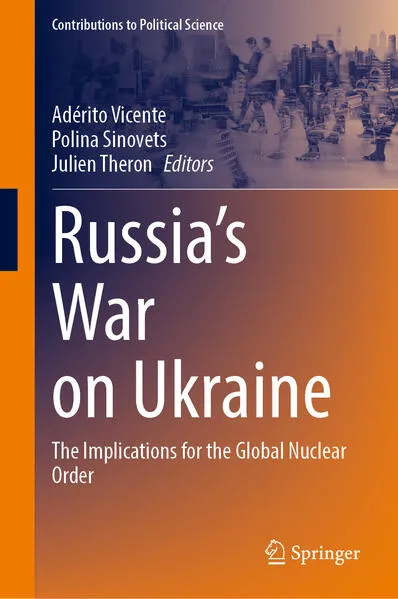
- Publikationen ca: 3
- Fragen & Antworten
Adérito Vicente
Adérito Vicente is a political scientist and, currently, a Non-Resident Fellow at Odesa Center for Nonproliferation, Ukraine. He holds a Ph.D. in Political and Social Sciences from the European University Institute in Florence, Italy. Previously, he was a Visiting Scholar at the James Martin Center for Nonproliferation Studies in Monterey, California, USA, and an Adjunct Professor at James Madison University’s M.A. program in European Union Policy Studies in Florence, Italy. Dr. Vicente also held other research and professional positions at the Robert Schuman Centre for Advanced Studies, the European Parliament, NATO, the European External Action Service, and the Disarmament and Non-Proliferation Division of the Portuguese Ministry of Foreign Affairs. His main research interests and teaching topics include nuclear politics, EU foreign and security policy, and transatlantic relations.
Polina Sinovets is an Associate Professor for Political Science at the Department of International Relations, Political Science and Sociology at Odesa I.I. Mechnikov National University (ONU), Ukraine, and the Head of the Odessa Center for Nonproliferation (OdCNP), based at ONU.
From 2017-2018 she was a Fulbright Fellow at the James Martin Center for Nonproliferation Studies, Monterey, California, USA. From March 2023 on she will also be a Research Fellow at NATO Defense College, Rome, Italy. Dr. Sinovets is an expert on nuclear weapons policy and has published articles in the Bulletin of the Atomic Scientists, Russia in Global Politics, and NATO Defense College Research Papers, among others. Her areas of expertise include nuclear deterrence, strategic stability, Russian nuclear policy, European security. She is the author of more than 80 research publications in scientific journals of Ukraine, Russia, and the US.
Julien Theron is a Lecturer in War studies at Sciences Po's Paris School of International Affairs (PSIA), France. Previously, he was a Senior Research Fellow at the Norwegian Institute for Defence Studies and former consultant for the French Ministry of Defense. Dr. Theron further contributes to the International Institute for Strategic Studies (IISS). Previously, he also taught at the Universities of Budapest (BME), Hungary, Beirut (USJ), Lebanon, Paris II Panthéon-Assas, France, and Paris Nanterre, France. His main research interests are threats, anticipation, adaptation, complex conflicts, and theories of war.
Russia’s War on Ukraine
This book explores how Russia’s War on Ukraine has changed the global nuclear order. The Russian aggression against Ukraine questioned the values of the liberal regimes and systems upon which the global nuclear order is built. At the heart of this nuclear order lies the 1968 Treaty on the Non-Proliferation of Nuclear Weapons (NPT), which remains until today the cornerstone of the global nuclear disarmament and nonproliferation regime.
Russia’s War on Ukraine
This book explores how Russia’s War on Ukraine has changed the global nuclear order. The Russian aggression against Ukraine questioned the values of the liberal regimes and systems upon which the global nuclear order is built. At the heart of this nuclear order lies the 1968 Treaty on the Non-Proliferation of Nuclear Weapons (NPT), which remains until today the cornerstone of the global nuclear disarmament and nonproliferation regime.
Russia’s War on Ukraine
This book explores how Russia’s War on Ukraine has changed the global nuclear order. The Russian aggression against Ukraine questioned the values of the liberal regimes and systems upon which the global nuclear order is built. At the heart of this nuclear order lies the 1968 Treaty on the Non-Proliferation of Nuclear Weapons (NPT), which remains until today the cornerstone of the global nuclear disarmament and nonproliferation regime.

